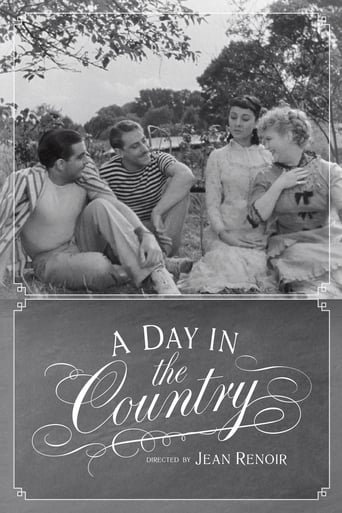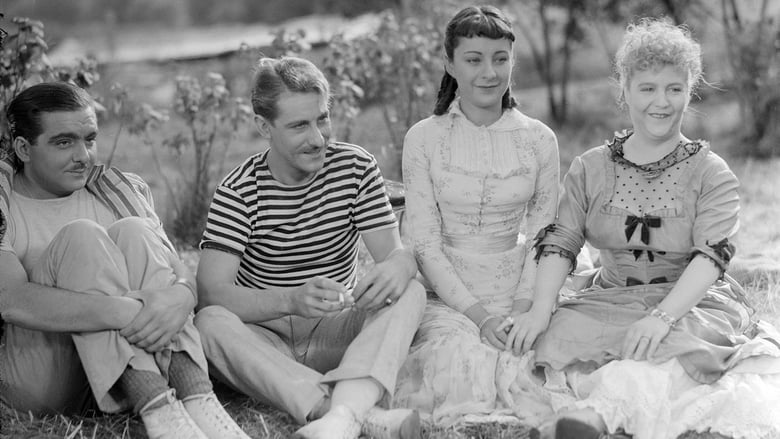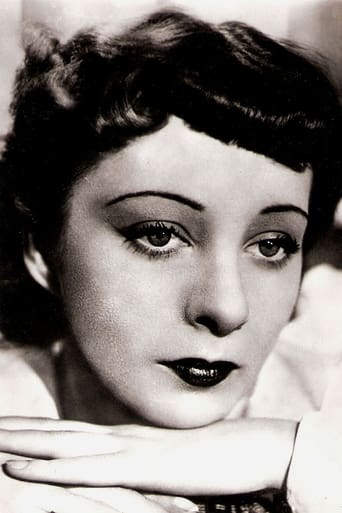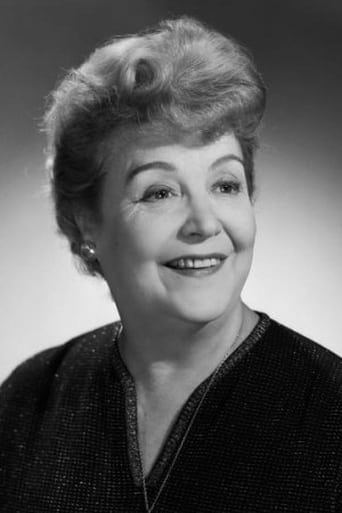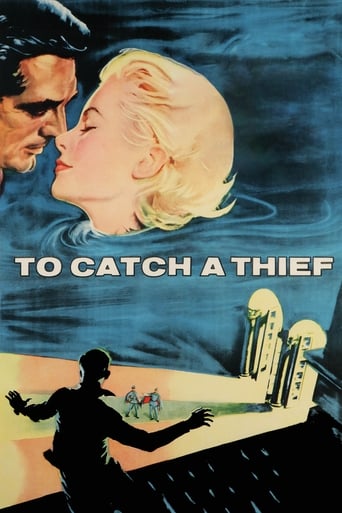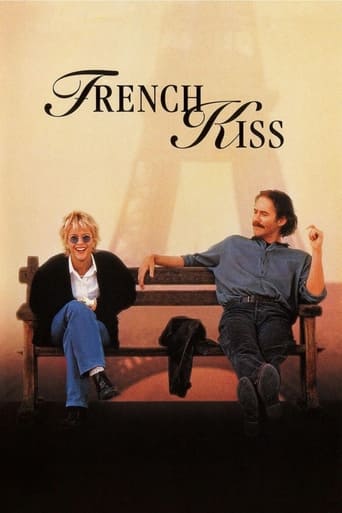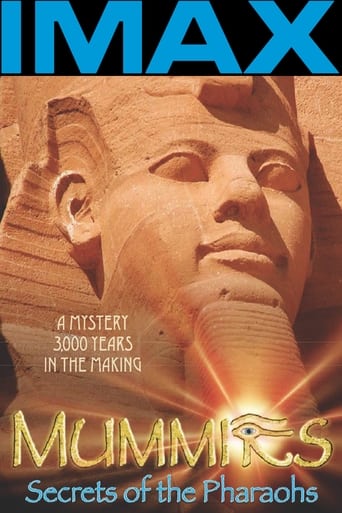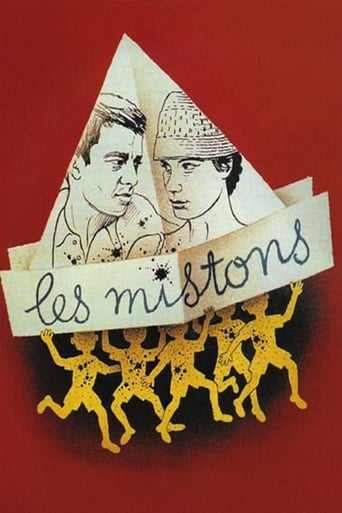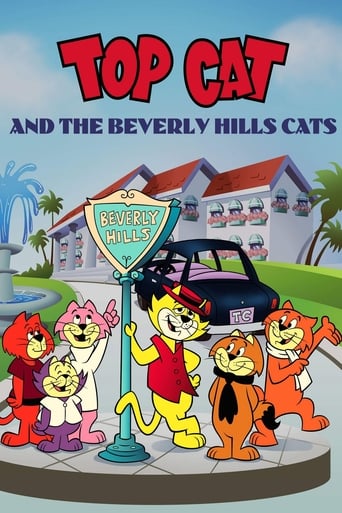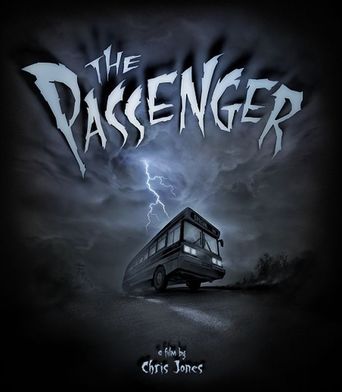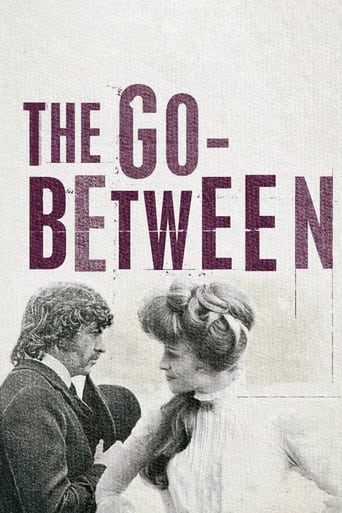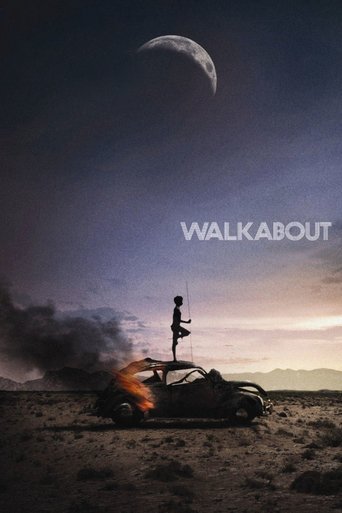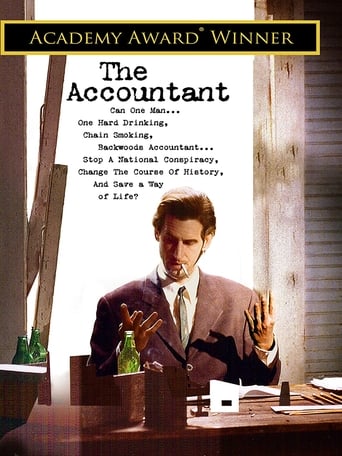A Day in the Country (1946)
The family of a Parisian shop-owner spends a day in the country. The daughter falls in love with a man at the inn, where they spend the day.
Watch Trailer
Cast


Similar titles
Reviews
What makes it different from others?
Tied for the best movie I have ever seen
That was an excellent one.
Although I seem to have had higher expectations than I thought, the movie is super entertaining.
The 40-minutes may be flawed, but the following is my take on the short's quietly compelling nature.Apparently, moviemaker Renoir was unable to complete the film. Still, the results amount to a subtle look at the seductive powers that nature can produce on sensitive souls. The story line proceeds more on tracking these poetic expansions than anything like a standard plot. City girl Henriette is immediately captivated by a lyrical expansion on her first visit to the French countryside. Sitting for the first time in the wild grass, her awareness responds both verbally and non-verbally to what is now a revealing enchantment beckoning to her. The trees, the grass, the river, even the critters that crawl. It is these moments of revelation that comprise the film's heart both literally and figuratively. And when in that same grassland, she later gives in to Henri's persistent pawing, it's like her surrender is not to a man, but to a climactic idea. To me, this is all provocatively rendered by Renoir and Co. What's not compelling are the goofy male characters who seem to have wandered in from a Laurel and Hardy short. Then again, maybe these antics are intended as sportive comment on less sensitive souls, especially male. It also appears that their only concern is what they can extract from the natural world (fishing), not for what that world has to reveal. A partial exception is Henri. Instead, he amounts to a man somewhere between the two poles. Despite his rural background, he apparently retains a certain clouded openness. That's implied when he moves from simple sexual desire for Henrietta to a glimpse of the sublime once they are in congress together. For each, it's that moment of unity that amounts to an unforgettable experience, but one whose pristine nature can never be repeated. Thus each is left to endure a lifetime of wistful longing. The sublime thus carries a price.Anyway, this is my take on a 40-minute film that may be flawed, but is also quietly provocative in a compelling way. It's also one I'll take with me, warily, next time I manage to backpack.
Unfortunately, A Day in the Country is an incomplete film that is only approximately forty minutes long. If things had gone differently, I believe that the film would now be considered Jean Renoir's masterpiece, because within these mere fragments of a work intended to be much larger, one can see a work of genius and beauty. The characters are memorable, the music is heartfelt, the cinematography is gorgeous, and the story is marvelous. Although The River is often praised for its stunning imagery, A Day in the Country may just be the most visually appealing of Renoir's work. His lens captures the countryside with true poeticism, consuming the viewer with its gentle beauty.Across his countryside landscape, Jean Renoir paints a portrait that combines laughter with tears. Beginning as a lighthearted farce, A Day in the Country eventually morphs into a poetic drama and romantic tragedy. The final sequence is the most notable, for it is among the most powerful and unexpected uses of flashing forward in time in cinematic history. Although its full intended impact cannot be felt due to the film's length running short, there is no denying how wonderfully crafted the final scene is within itself. Even without context, one cannot help but choke up a little when witnessing such sadness.Dipped in tenderness and humor, A Day in the Country is an elegant work of art that is sadly short in length, but remains just as powerful as films three times as long despite these unfortunate circumstances.
Though most people know this fact it bears repeating within the context of looking at A Day in the Country, the long-short film (though too short for a feature) that Jean Renoir directed in 1936 and released officially 10 years later, that he had blood-ties to the painter Renoir of the same name. Though the older artist had his own approach to depicting humanity and the filmmaker had his (and the latter often doing sort of gentle-but-really-not satires on how people live and interact, i.e. Boudu or Rules of the Game), there was a similar sense of, 'hey, they both want to bring out a freshness and vitality to being alive that is unique to them. And so in A Day in the Country, which is simply about two women, a mother and a daughter, who go out to have a picnic and go out on the lake and eat under a cherry tree and meet two men who basically spend their time hitting on them (and before this we see the two men contemplate how to do this), the filmmaker more than any other time I can think of uses the location and actors like a painter would.It may also be because of the time period from the Maupassant story in the mid 19th century, but it's hard for me to shake when watching this how it's kind of like a painting from that time period (or a little after) of Renoir only done here in the flesh. When the two ladies are sitting on the grass laughing and smiling and having a feeling between total joy and a sort of latent lament about knowing this is just an escape until they go back to Paris it's shot like every little thing is artfully considered in placement: actors, where the tree is, the grass, the lighting. Ironic that the rain was a big issue and, according to him on the Criterion DVD, he had to rewrite the script to fit it (and in a way it's a good thing he did as it adds another dimension: it's not ALL sunny, and the rain can spoil a perfectly good way - or just add another level to it).I could critique the film as not being especially "deep" and that it's mostly a gentle little dip with these characters, but that's not entirely true. I saw a lot of deep emotions with these characters and the details that accumulate by the end scene where it cuts ahead years later when things have changed for the daughter it has an impact - she marries another man who we also see here accompanying the two. There may be a lot of reliance on the music to lift things up with big swells of this or that for scenes, but mostly what makes Day in the Country so appealing is its simplicity and its spirit of gentility. There are characters who have just mildly varying degrees of sophistication, which may not even be much at all, and so when the mother character is in total delight and exuberation about something, or a character petting a tiny kitten, or how the daughter reacts when being asked by the man she's with if they can go to the shore to 'stretch their legs' (which means something else of course, kissing and getting more intimate), the reactions are totally genuine.This isn't Renoir in satire mode; he's out to use his 40 minutes to bring us to a very pleasant but extraordinary feeling - whether he truly intended to finish this as a longer film or keep it as is is hard to say, as the Renoir of 1960 claims this version is fine the way it is. This may not mean it has the same rewatchability of a Grand Illusion but that's alright; it's like being along with these characters and experiencing things as pure views: the country IS a nice place to be in, and yet if you want to stay there for good is the question you have to ask yourself. And of course the love part of the story is another thing, but connected with this: if you really fall in love out here will it be the same as if you were in the city? It's a big, happy movie with subtle lines that are fascinating.
Just how unfinished "Partie De Campagne" truly is remains something of a contentious issue. There are countless differing theories and opinions, some of which seem to have been instigated by the director himself. There are those, this reviewer included, who believe Renoir originally intended this film as one-half of a double feature of Guy De Maupassant adaptations. Whatever might have once been planned, however, does nothing to soften the radiant beauty and brilliance of the film.Renoir had collected around himself a group of friends and family in the hope of creating what he later described as a "holiday" atmosphere during the scheduled week of filming. In accordance with the story on which it is based, long summer days and balmy afternoons by the river banks were called for in Renoir's script. Unfortunately, the cast and crew were faced with a damp, dismal July which continued long into August. Cramped up in the lobby of the hotel, sheltering from the storms outside, personal tensions and rivalries soon inevitably surfaced. With the months continuing to pass and little to show the financial backers in the rushes, money became scarce. Eventually, after refusing Sylvia Bataille's request for leave so she might audition for a future project in Paris, the director himself nonchalantly announced he would be abandoning the film to concentrate his efforts on his next film, Les Bas-fonds.Considering all of the above, it is miraculous that the film we see today is such a luminous, sensual masterpiece.Much is made of Renoir's use of deep focus techniques in films such as Le Regle de Jeu and La Grande Illusion, quite rightly so, but it is also used to great effect in this film. The film's early scenes largely take place inside a rural inn. Renoir keeps the camera mostly in one place, stationary. Then, suddenly, a window is opened; light floods in, we see trees, a breeze blowing lightly through grass, a young woman and her mother arcing high into the summer air on swings. Now we cut to a close-up of the girl, with the camera fixed to the swing, an accomplice to her every movement. She is laughing, ecstatic, exhilarated by her surroundings. It is an exhilarating moment in cinema, the sudden infusion of life and nature into the film echoes in the viewer's mind throughout the short running time.Renoir is a great film-maker, perhaps the greatest of all, and this is a great film, perhaps his greatest of all.

